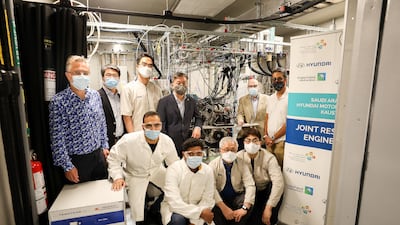Saudi Aramco, the world’s largest oil-exporting company, is teaming up with South Korea's Hyundai Motor Group and King Abdullah University of Science and Technology (Kaust) to jointly research and develop advanced fuels for an "ultra lean-burn, spark-ignition engine" that aims to lower overall emissions in hybrid vehicles.
As part of the two-year partnership, Aramco, which has significant research and development and operational experience in fuel formulations, will use its in-house capabilities to design an optimal fuel formulation.
Hyundai Motor Group will provide an ultra-lean gasoline engine for use by the research team, Saudi Aramco said in a statement on Tuesday. The tests will be conducted by researchers in the Clean Combustion Research Centre at Kaust.
“As hybrid electrical vehicles are rolled out, the real challenge now lies in making strides with optimal fuels and exceptional combustion systems,” Ahmad Al-Khowaiter, Aramco’s chief technology officer, said.
“The Aramco team provides fuel design and blending know-how to improve Hyundai Motor Group engine combustion performance and the outcome could lead to the application of synthetic e-fuels.”
The demand for hybrid vehicles, which are powered by an internal combustion engine (ICE) and an electric motor, is expected to soar as the world focuses on cutting emissions to protect the environment. The hybrid vehicle market is expected to reach $1490.1 billion in 2027 from $324.92bn in 2021, according to Mordor Intelligence.
“BEVs (battery electric vehicles) and FCEVs (fuel electric vehicles) will be Hyundai Motor Group’s ultimate technologies to achieve carbon-neutral mobility, while eco-friendly advanced ICE technology that combines eco-friendly fuel and ultra-lean burn engine will be the key to effectively reduce greenhouse gas emissions during our transition to EVs,” Alain Raposo, executive vice president at Hyundai Motor Group, said.
Aramco is forging partnerships with top automakers globally to accelerate the development of transportation technologies that can reduce emissions and improve fuel efficiency.
Last month, it signed an agreement with Formula One’s Aston Martin for the development of highly efficient internal combustion engines, sustainable fuels and advanced lubricants to lower emissions in racing cars.
Aramco also has research centres in Dhahran in Saudi Arabia, Paris, Detroit and Shanghai. The state-owned oil company aims to achieve net-zero carbon emissions in its operations by 2050.
Saudi Aramco's 2021 net profit more than doubled to $110bn, helped by the consolidation of Sabic's full-year results and stronger refining and chemicals margins, the company said earlier this month.


